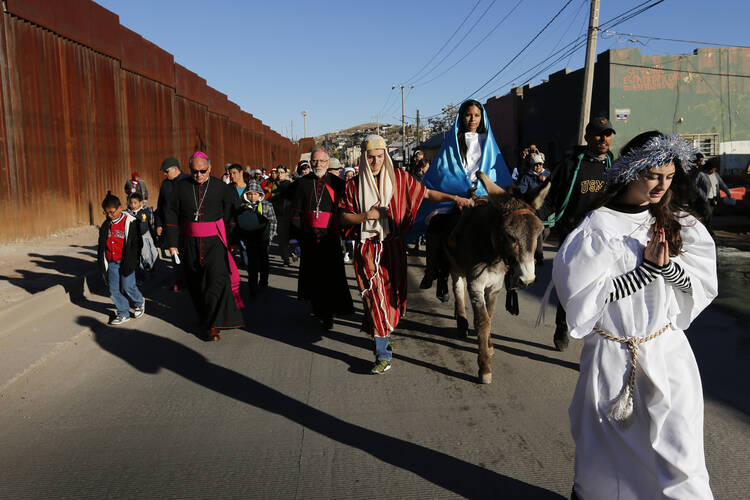On Dec. 28, the Monday after Christmas this year, we will celebrate the Feast of the “Holy Innocents” and the Gospel reading for that day will begin:
When the magi had departed, behold,
the angel of the Lord appeared to Joseph in a dream and said,
“Rise, take the child and his mother, flee to Egypt.
Herod is going to search for the child to destroy him” (Mt 2:13).
And sometime in early January, according to a Washington Post story this morning, our country will begin a series of raids aimed at deporting Central American families who have fled increasing violence there, and whose flight has led them across our borders illegally.
The cycle of liturgical time often brings us these overlaps of salvation history with current events, but rarely this tragically.
Our immigration problems are complicated; the political debate over them seems intractable. I don’t pretend to have a solution. And I acknowledge that whatever solution is politicaly possible will have to involve some elements of securing our southern border.
But this set of planned raids? Raids aimed at families fleeing violence, and apparently timed, in part, to signal to families fleeing increased violence now that the door is closed?
We are taking the side of Herod. We are embodying Herod’s fear about the loss of his own status and security and, dominated by it, sending victims back to the violence.
Does our response to people crossing our borders illegally need to be this cruel? Does the news need to be managed to happen during the Christmas holidays when most people aren't paying as much attention to the headlines? Especially for the many of us who are descended from immigrants who fled economic hardship and persecution in Europe, can't we see our own grandparents and great-grandparents in similar situations not so along ago, and be moved to help?
Here are some suggestions about how to respond:
If you are on the fence about whether or not these immigrants deserve refuge:
- Watch the video from Jesuit Refugee Services, below, telling the story about these families are fleeing. Read some of the refugees' stories.
- Take a look at some of the U.S. bishops’ statements regarding immigration, to help inform your discernment about the moral issues.
- Spend some time seriously praying for the safety of these families we’re about to send back into violence. Whether or not you change your mind, they need the prayers anyway.
If you’re already convinced that we owe these immigrants refuge rather than increased enforcement:
- Call your legislators, especially if you are represented by someone with a hard-line stance against undocumented immigrants. Let them know that view does not represent you. If you are supporting a candidate who does not reflect your views on immigration, let them know where you differ.
- Dialogue with family and friends who do not share your views on immigration. Do not go into the conversation as an argument, but listen to their concerns, and share yours with them. Explain why you feel that this response to immigrants betrays American values and how the Gospel calls us to more. Maybe share this post.
- Pray for the families in danger of deportation; pray for those who don’t think that the United States can afford to offer them refuge.
- Make a donation—perhaps to Jesuit Refugee Services USA and their Kino Border Initative. Or maybe to the Catholic Legal Immigration Network, which helps immigrants in need of legal services.








